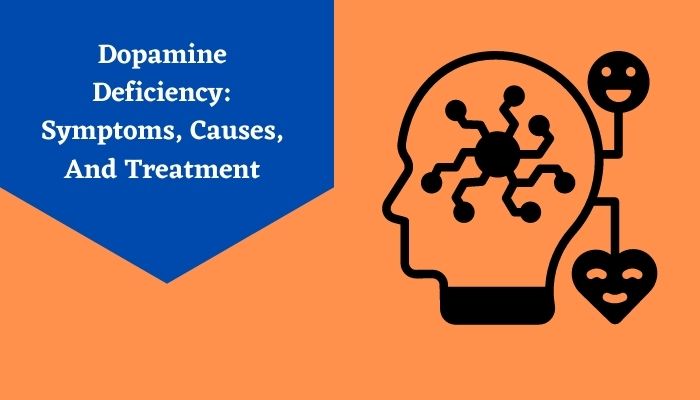Dopamine is a form of neurotransmitter that helps regulate messages in the nervous system to make you feel serene. It is often dubbed as the ‘Happy Hormone’ due to its ability to reconstruct the body’s emotional response to a stimulus.
Dopamine deficiency is a syndrome in which the levels of the ‘Happy Hormone’ in your body are lower than usual. The deficiency syndrome is hereditary and is quite rare. It often affects the prenatal phase and develops during the childhood and teenage years.
The dopamine deficiency syndrome can demonstrate symptoms that often seem like other movement diseases, such as Juvenile Parkinson’s, which leads to misdiagnosis. It is best to consult a physician if you have the symptoms and let’s take a look at what they are.
What Are the Symptoms of Dopamine Deficiency?
If you develop dopamine deficiency, you will most likely have the symptoms mentioned below. If you do notice these symptoms, it is good to consult with a doctor and begin your treatment as early as possible. Dopamine deficiency is not curable but you can control the effects with low dopamine treatment.Here are the dopamine deficiency symptoms that you need to look out for and seek medication for dopamine at the earliest from a medical professional:
- Constipation
- Exertion when swallowing or eating
- Cramping muscles
- Muscle spasm
- Tremors or trembling limbs
- Bradykinesia, which is when your muscles move very slowly
- Rigidity in muscles
- A problem in speaking coherently
- Difficulty sitting or standing upright and in balancing the body
- Rapid or uncontrolled movements in the eyes
- Gastroesophageal Reflux Disease or GERD
- Difficulty falling asleep
- Pneumonia affecting you often
What Are the Causes of Dopamine Deficiency?
Dopamine is a very important hormone that helps regulate your mood and intellect. Researchers have found that the dopamine deficiency syndrome is often a result of the SLC6A3 gene mutating to create the dopamine transporter protein.The dopamine transporter protein helps standardize the amount of dopamine that is transmitted throughout your body optimally. If the amount of dopamine in your body is too high, you could experience jittery feelings. However, if the amount of dopamine in your body is too low, then you will have the symptoms mentioned above and your muscle movements will be limited.
The cause of dopamine deficiency can be due to any of the usual bodily functions. It can be anything from stress, consumption of excessive saturated fats, obesity, and sleep deprivation. While these problems are uncontrollable, dopamine deficiency can also be caused by abusing drugs. If you consume too many drugs, the levels of dopamine in your body begin to fall rapidly and you eventually start experiencing the symptoms of dopamine deficiency.
Who Is Likely to Suffer From Dopamine Deficiency?
Since dopamine deficiency is a genetic syndrome, anyone can suffer from the syndrome at any time. In the most common scenarios, the parents carry the mutated SLC6A3 gene and pass it down to the children. Sometimes, if one of the parents carries the gene, the likelihood of the child contracting the dopamine deficiency syndrome is very low. However, if both parents carry the SLC6A3 gene, the child is very likely to contract the syndrome from a prenatal stage.It develops slowly through the infantile stage through to the juvenile teenage years. It is best to seek treatment from the initiation of the symptoms to control how badly the levels of dopamine deficiency affect your body.
Seeking low dopamine treatment or professional recommendations for medication for dopamine can help control the problem to a large extent. Therefore, by the early adult stages, you will experience a manageable level of dopamine deficiency.
How to Diagnose Dopamine Deficiency?
To prescribe the appropriate medication for dopamine deficiency, medical professionals will have to conduct the required tests. Usually, when a child displays symptoms of imbalance or difficulty in movement, they will be diagnosed.Medical professionals often opt for checking a blood sample for genetic markers. If the results indicate a positive marker for the SLC6A3 genes, they sometimes opt to extract cerebrospinal fluid and diagnose it for acids related to the dopamine hormone. The process is referred to as neurotransmitter profiling.
Treatment for Low Dopamine
Diagnosing dopamine deficiency will aid in determining the appropriate treatment for your specific condition. Since it is a movement-related issue, researchers often trial and test with milder medication for dopamine.There are several medications for dopamine that are primordially dopamine antagonists used to treat Parkinson’s and other movement-related diseases in adults. Medical professionals often use Ropinirole, Pramipexole, etc. with some amount of success in the low dopamine treatment.
There are also other forms of low dopamine treatment that involve addressing the symptoms individually to reduce the effects of dopamine deficiency. Medical professionals will often recommend medications for dopamine that help with muscle stiffness, GERD, breathing difficulties, infections in the lungs and respiratory tracts, constipation, etc.
The medication for dopamine may have certain adverse effects, therefore it is best to get a consultation before you seek low dopamine treatment. Medical professionals can diagnose your reactions to certain drugs and prescribe more effective solutions.
Conclusion
Dopamine deficiency is a rare syndrome that affects very few people, mostly from birth. If you observe any of the symptoms in a child or even an adult, it is best to consult a doctor at the earliest.The sooner you seek low dopamine treatments, the faster you can control the symptoms of the syndrome. Medication for dopamine is effective to balance the movements of the body and helping manage more severe symptoms like GERD as well.
Even though dopamine deficiency is not entirely treatable, you can easily regulate the effects it has on your body with low dopamine treatment. That is why you must never ignore the symptoms, no matter how rare the disorder may seem.


